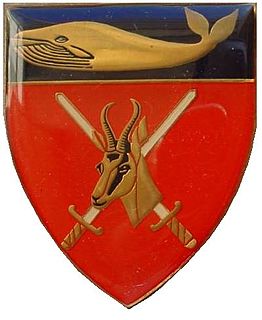
The Union of South Africa is the historical predecessor to the present-day Republic of South Africa. It came into being on 31 May 1910 with the unification of the Cape Colony, the Natal Colony, the Transvaal, and the Orange River Colony. It included the territories that were formerly a part of the South African Republic and the Orange Free State.

The Sharpeville massacre was an event which occurred on 21 March 1960, at the police station in the South African township of Sharpeville in Transvaal.

The National Party (NP), also known as the Nationalist Party, was a political party in South Africa founded in 1914 and disbanded in 1997. The party was originally an Afrikaner ethnic nationalist party that promoted Afrikaner interests in South Africa. However in the early 1990s it became a South African civic nationalist party seeking to represent all South Africans. It first became the governing party of the country in 1924. It was in opposition during World War II but it returned to power and was again in the government from 4 June 1948 until 9 May 1994.

The Defiance Campaign against Unjust Laws was presented by the African National Congress (ANC) at a conference held in Bloemfontein, South Africa in December 1951. The Campaign had roots in events leading up the conference. The demonstrations, taking place in 1952 were the first "large-scale, multi-racial political mobilization against apartheid laws under a common leadership."
In South Africa, pass laws were a form of internal passport system designed to segregate the population, manage urbanisation, and allocate migrant labour. Also known as the natives law, pass laws severely limited the movements of not only black African citizens, but other people as well by requiring them to carry pass books when outside their homelands or designated areas. Before the 1950s, this legislation largely applied to African men, and attempts to apply it to women in the 1910s and 1950s were met with significant protests. Pass laws would be one of the dominant features of the country's apartheid system, until it was effectively ended in 1986.

Apartheid was a system of institutionalised racial segregation that existed in South Africa and South West Africa (Namibia) from 1948 until the early 1990s. Apartheid was characterised by an authoritarian political culture based on baasskap, which encouraged state repression of Black African, Coloured, and Asian South Africans for the benefit of the nation's minority white population. The economic legacy and social effects of apartheid continue to the present day.

The South Africa Act 1909 was an Act of the British Parliament which created the Union of South Africa from the British colonies of the Cape of Good Hope, Natal, Orange River Colony, and Transvaal. The Act also made provisions for admitting Rhodesia as a fifth province of the Union in the future, but Rhodesian colonists rejected this option in a referendum held in 1922. The South Africa Act was the third major piece of legislation passed by the Parliament of the United Kingdom with the intent of uniting various British colonies and granting them some degree of autonomy. Earlier, the British North America Act, 1867 had united three colonies and the Commonwealth of Australia Constitution Act, 1900 had united the Australian colonies.
The system of racial segregation in South Africa known as apartheid was implemented and enforced by a large number of acts and other laws. This legislation served to institutionalise racial discrimination and the dominance by white people over people of other races. While the bulk of this legislation was enacted after the election of the National Party government in 1948, it was preceded by discriminatory legislation enacted under earlier British and Afrikaner governments. Apartheid is distinguished from segregation in other countries by the systematic way in which it was formalised in law.
Racial passing occurs when a person classified as a member of one racial group is accepted as a member of a racial group other than their own. Historically, the term has been used primarily in the United States to describe a person of color or multiracial ancestry who has assimilated into the white majority during times when legal and social conventions of hypodescent classified the person as a minority, subject to racial segregation and discrimination, regardless of their actual ancestry.
Terrorism in South Africa has not been seen as a significant threat to the security of the state since the end of apartheid.

The African National Congress Women's League (ANCWL) is a political group in South Africa. The president is Bathabile Dlamini.
Jim Crow laws were state and local laws that enforced racial segregation in the Southern United States. All were enacted in the late 19th and early 20th centuries by white Democratic-dominated state legislatures after the Reconstruction period. The laws were enforced until 1965. In practice, Jim Crow laws mandated racial segregation in all public facilities in the states of the former Confederate States of America and other states, starting in the 1870s and 1880s, and were upheld in 1896, by the U.S. Supreme Court's "separate but equal" legal doctrine for facilities for African Americans, established with the court's decision in the case of Plessy vs. Ferguson. Moreover, public education had essentially been segregated since its establishment in most of the South, after the Civil War (1861–65).

Knight's Pass is a mountain pass located in the KwaZulu-Natal province of South Africa near Utrecht.

The visa policy of South Africa is how the South African government determines who may and may not enter their country. Visitors to South Africa must obtain a visa from one of the South African diplomatic missions unless they come from one of the visa exempt countries, in which case they get what is called a "Port of Entry Visa". Visitors who require a visa must apply in person and provide biometric data.

Slavery in South Africa existed until the abolition of slavery in 1834.
The Coloured vote constitutional crisis, also known as the Coloured vote case, was a constitutional crisis that occurred in the Union of South Africa during the 1950s as the result of an attempt by the Nationalist government to remove Coloured voters in the Union's Cape Province from the common voters' rolls. It developed into a dispute between Parliament and the judiciary, on the one hand, and the Appellate Division of the Supreme Court, on the other hand, over the power of Parliament to amend an entrenched clause in the South Africa Act and the power of the Appellate Division to overturn the amendment as unconstitutional. The crisis ended when the government enlarged the Senate and altered its method of election, allowing the amendment to be successfully enacted.
Women's March was a march that took place on 9 August 1956 in Pretoria, South Africa. The marchers' aims were to protest the introduction of the Apartheid pass laws for black women in 1952 and the presentation of a petition to the then Prime Minister J.G. Strijdom.

The Walvis Bay Military Area was a specific militarised zone bordering South West Africa during the South African Border War. Military equipment was freighted through the harbour to support operations throughout South West Africa.

Feminism in South Africa has been shaped by struggles for political and racial equality, as well as by national and transnational struggles for gender equality. Woman in South Africa have historically faced a myriad of state-facilitated and socially-practiced discrimination including pay discrimination, the inability for all women to vote until 1983 and cultural sexism manifesting through severe violence against women. South Africa has high rates of rape and domestic violence which frequently goes unreported. Nearly one third of adolescent girls report being sexually coerced by men by the time they turn 16 with this statistic matriculating into high rates of sexual harassment and assault experienced by women.















